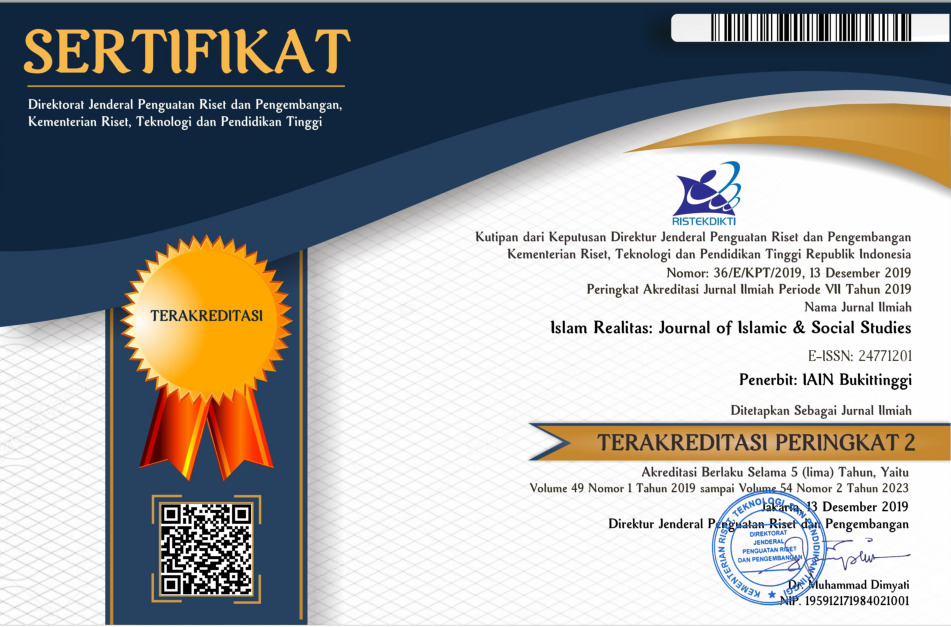Dynamics of Religious Behavior of Street Vendors in Narmada Terminal, West Lombok Regency: An Anthropological-Phenomenological Study
Downloads
This study examines the dynamics of religious behavior among street vendors in the Narmada District, West Lombok Regency, West Nusa Tenggara Province. Religion is comprehensively understood to encompass both esoteric dimensions (belief, conviction, and spiritual experiences) and exoteric dimensions (rituals and practices). The study employs a religiosity research approach and an anthropological-phenomenological method. Out of 42 vendors, the research sample includes 10 street vendors selected through purposive sampling. Primary data is collected through in-depth interviews with street vendors and village authorities, while secondary data is gathered through observation and literature review to capture the phenomena and manifestations of religious behavior. This study found that the typology of religious behavior of street vendors in Narmada identified forms a unique pattern, characterized by conditional behaviors that mimic the priyayi style, adopt a santri-like demeanor at specific times, or embrace an abangan style. These behavioral patterns are influenced by internal factors, such as psychological conditions (hope and fear), and external factors, including pragmatic positivist elements (government policies, community dynamics, modernism, technology, and education levels). Economic conditions and the nature of the vendors' occupation also play a crucial role in shaping and attributing meaning to their religious behavior.
Penelitian ini mengamati dan menguraikan dinamika perilaku keagamaan di kalangan pedagang kaki lima (PKL) di Terminal Narmada, Kabupaten Lombok Barat. Pemahaman agama didefinisikan secara menyeluruh, mencakup dimensi esoterik (keyakinan, kepercayaan, dan pengalaman spiritual) dan dimensi eksoterik (ritual dan praktik). Menggunakan pendekatan penelitian religiositas dan metode antropologis-fenomenologis, data primer diperoleh melalui wawancara mendalam dengan PKL dan aparat desa, sedangkan data sekunder diperoleh melalui observasi dan tinjauan pustaka untuk menangkap fenomena dan manifestasi perilaku keagamaan. Penelitian melibatkan 10 PKL yang dipilih melalui teknik purposive sampling. Tipologi perilaku keagamaan yang muncul membentuk pola unik, meliputi perilaku bersyarat yang menyerupai gaya priyayi, bersikap santri pada waktu tertentu, atau mengikuti gaya abangan. Faktor internal, seperti kondisi psikologis (harapan dan ketakutan), dan faktor eksternal, termasuk elemen positivis pragmatis (kebijakan pemerintah, dinamika masyarakat, modernisme, teknologi, dan tingkat pendidikan), memengaruhi pola-pola perilaku ini. Kondisi ekonomi dan jenis pekerjaan juga memainkan peran penting dalam membentuk dan memberikan makna pada perilaku keagamaan PKL di Terminal Narmada, Kabupaten Lombok Barat, NTB
Books
Abdullah, Taufik, and M.Rusli Karim, Metodologi Penelitian Agama : Sebuah Pengantar, 2nd edn (Yogyakarta: Tiara Wacana, 1989)
Aziz, Aceng Abdul, Anis Masykhur, A. Khoirul Anam, Ali Muhtarom, Idris Masudi, and Masduki Duryat, Implementasi Moderasi Beragama Balam Pendidikan Islam, (Jakarta: Kementerian Agama RI, 2019
Boyatzis, Chris J., David C. Dollahite, and Loren D. Marks, ‘The Family as a Context for Religious and Spiritual Development in Children and Youth’, in The Handbook of Spiritual Development in Childhood and Adolescence (California United States: SAGE Publications, Inc., 2006)
Festinger, Leon, A Theory of Cognitive Dissonance., A Theory of Cognitive Dissonance. (Stanford University Press, 1957)
Crocker, Jennifer, Brenda Major, and Claude Steele, ‘Social Stigma.’, in The Handbook of Social Psychology, Vols. 1-2, 4th Ed. (New York, NY, US: McGraw-Hill, 1998), pp. 504–53
Geertz, C, The Interpretation Of Cultures, ACLS Humanities E-Book (Basic Books, 1973)
Helaluddin, Helaluddin, and Hengki Wijaya, Analisis Data Kualitatif Sebuah Tinjauan Teori & Praktik (Jakarta: JTT Jaffray Press, 2019)
Kahmad, Dadang, and Cucu Cuanda, Sosiologi Agama (Remaja Rosdakarya, 2000)
Van Peursen, C. A., Cultuur in Stroomversnelling : Een Geheel Bewerkte Uitgave van Strategie van de Cultuur, ed. by Dick Hartoko (Yogyakarta: Kanisius, 1976)
Sugiyono, Metode Penelitian Pendidikan : Pendekatan Kuantitatif, Kualitatif, dan R&D, 21st edn (Bandung: Alfabeta, 2015)
Suyono, A, and A Siregar, Kamus Antropologi (Akademika Pressindo, 1985) <https://books.google.co.id/books?id=zYYiAAAAMAAJ>
Journals
Anwar, Aidil, Alfiyani Barokah, Indah Widiya, Maulida Jam’ah, and Siti Bejana Siagian, ‘Faktor Yang Mempengaruhi Kehidupan Beragama dan Sosial Masyarakat Serta Aktivitas Ibadah di Desa Simonis Kec. Aek Natas Kab. Labuhanbatu Utara’, JIIP - Jurnal Ilmiah Ilmu Pendidikan, 5.10 (2022), 4015–19 <https://doi.org/10.54371/jiip.v5i10.1001>
Anwar, Khairil, and Rubino, ‘Analysis of Religious Behavior of Street Vendors In Percut Sei Tuan District’, Indonesian Interdisciplinary Journal of Sharia Economics (IIJSE), 6.3 (2023), 3005–13
Ariyanto, Eko April, Fitriyana Dwi Ayu Ningrum, and Sahat Saragih, ‘Keikutsertaan pada Organisasi Keagamaan dan Empati dengan Perilaku Prososial pada Remaja Yang Aktif dalam Organisasi Keagamaan’, Philanthropy: Journal of Psychology, 5.1 (2021), 206 <https://doi.org/10.26623/philanthropy.v5i1.2454>
Ashar, Salim, ‘Nilai-Nilai Pendidikan Islam Dalam Tradisi Tahlilan Sebagai Harmoni Sosial Masyarakat Sudimoro Megaluh Jombang’, Sumbula: Jurnal Studi Keagamaan, Sosial Dan Budaya, 6.2 (2021), 183–212 <https://doi.org/10.32492/sumbula.v6i2.4558>
Aswan, Khairil, Habibatul Hidayati, and Rani Permata Sari, ‘Business Location, Business Capital, And Infrastructure Facilities On Income Levels Of Street Traders At Water Boom Tourism Object In Sawahlunto City’, Jurnal Apresiasi Ekonomi, 11.3 (2023), 671–80 <https://doi.org/10.31846/jae.v11i3.698>
Awalia, Rezki, Rachmat Saleh, Andi Chairul Achsan, Dwinsani Pratiwi Astha, and R Chistin Dara Maria, ‘Study Activities of Street Vendors in The Utilization of Space in Tatanga District, Palu City (Case Study: I Gusti Ngurah Rai Corridor)’, IOP Conference Series: Earth and Environmental Science, 1075.1 (2022), 012040 <https://doi.org/10.1088/1755-1315/1075/1/012040>
Aziz, Ahmad Amir, ‘Living Teologi: Religiusitas dan Hubungan Sosial Pedagang Kaki Lima’, Jurnal Theologia, 31.1 (2020), 87 <https://doi.org/10.21580/teo.2020.31.1.5756>
Biscotti, Dina, and Nicole Woolsey Biggart, ‘Organizing Belief: Interfaith Social Change Organizations in the Religious-Environmental Movement’, 2014, pp. 413–39 <https://doi.org/10.1108/S0733-558X20140000041019>
Burhani, Ahmad Najib, ‘Geertz’s Trichotomy of Abangan, Santri, And Priyayi: Controversy and Continuity’, Journal of Indonesian Islam, 11.2 (2017), 329 <https://doi.org/10.15642/JIIS.2017.11.2.329-350>
Carneiro, Ana, Hélder Fernando Pedrosa e Sousa, Maria Alzira Pimenta Dinis, and Ângela Leite, ‘Human Values and Religion: Evidence from the European Social Survey’, Social Sciences, 10.2 (2021), 75 <https://doi.org/10.3390/socsci10020075>
Djakfar, Muhammad, ‘Religion, Work Ethics, and Business Attitude: A Case Study on the Meaning of Business Behavior of Madurese Fruits Traders in Malang’, The International Journal o f Accounting and Business Society, 16.2 (2007), 93–110
Faisal, Ahmad, Mustaqim Pabbajah, Irwan Abdullah, Nova Effenty Muhammad, and Muh. Rusli, ‘Strengthening Religious Moderatism through the Traditional Authority of Kiai in Indonesia’, Cogent Social Sciences, 8.1 (2022) <https://doi.org/10.1080/23311886.2022.2150450>
Faqihuddin, Ahmad, ‘Muhammad Abduh’, Tahdzib Al-Akhlaq: Jurnal Pendidikan Islam, 4.2 (2021), 27–38 <https://doi.org/10.34005/tahdzib.v4i2.1598>
Firdaus, Muhammad Nuril, and Fahrur Ulum, ‘Religious Behavior and Trade Tithe Compliance of Muslimah Entrepreneurs In Surabaya’, Diversity : Logic Journal Multidisiplinary, 1.1 (2023), 25–34
Jayadi, Suparman, and Ratih Rahmawati, ‘Religious Behavior Of Agrarian Community In Lingsar Village, Lombok Barat’, Agrisocionomics: Jurnal Sosial Ekonomi Pertanian, 5.1 (2021), 144–52 <https://doi.org/10.14710/agrisocionomics.v5i1.8531>
Kirchmaier, Isadora, Jens Prüfer, and Stefan T. Trautmann, ‘Religion, Moral Attitudes and Economic Behavior’, Journal of Economic Behavior & Organization, 148 (2018), 282–300 <https://doi.org/10.1016/j.jebo.2018.02.022>
Koole, Sander L., Marieke Meijer, and Carina Remmers, ‘Religious Rituals as Tools for Adaptive Self-Regulation’, Religion, Brain & Behavior, 7.3 (2017), 250–53 <https://doi.org/10.1080/2153599X.2016.1156562>
Kustermans, Jorg, Ted Svensson, Julia Costa López, Tracey Blasenheim, and Alvina Hoffmann, ‘Ritual and Authority in World Politics’, Cambridge Review of International Affairs, 35.1 (2022), 2–30 <https://doi.org/10.1080/09557571.2021.1975647>
Marpaung, Syafri Fadillah, Muhammad Irvan Marsya, and Hasian Rambe, ‘Perilaku Masyarakat Dalam Mengamalkan Nilai Keagamaan Di Desa Ndeskati Kaupaten Karo’, Edukatif : Jurnal Ilmu Pendidikan, 4.6 (2022), 7774–83 <https://doi.org/10.31004/edukatif.v4i6.4121>
Mutiatur Rasul, Ummay Sumaiya, and Muhammad Salah Uddin, ‘Blessings on a Cart: Ramadan and Street Vendors in Dhaka’, Asian Journal of Management, 2023, 29–36 <https://doi.org/10.52711/2321-5763.2023.00006>
Permana, Aramdhan KP, ‘Diskursus Tafsir Esoteris Dalam Al-Qur’an’, Jurnal At-Tadbir : Media Hukum Dan Pendidikan, 32.1 (2022), 12–35 <https://doi.org/10.52030/attadbir.v32i1.123>
Rahayu, M J, I Buchori, and R Widjajanti, ‘Study of Locations’characteristics for Stabilization of Street Vendors in Surakarta City’, IOP Conference Series: Earth and Environmental Science, 106 (2018), 012063 <https://doi.org/10.1088/1755-1315/106/1/012063>
Ristea, Ion, ‘Reflections on Mechanisms Influencing Human Behavior’, Procedia - Social and Behavioral Sciences, 92.Lumen (2013), 799–805 <https://doi.org/10.1016/j.sbspro.2013.08.757>
Saroglou, Vassilis, and Adam B. Cohen, ‘Psychology of Culture and Religion’, Journal of Cross-Cultural Psychology, 42.8 (2011), 1309–19 <https://doi.org/10.1177/0022022111412254>
Smart, N, Religions of Asia (Prentice Hall, 1993)
Subki, Subki, ‘Religious Attitude of the Muslim Community of Lombok Island in the Covid-19 Pandemic Season’, International Journal of Social Science Research and Review, 4.4 (2021), 127–34 <https://doi.org/10.47814/ijssrr.v4i4.115>
van Tuyll van Serooskerken, Jacqueline M., Agnes M. Willemen, Anne de la Croix, Petri J.C.M. Embregts, and Carlo Schuengel, ‘Satisfying Basic Psychological Needs among People with Complex Support Needs: A Self-Determination Theory-Guided Analysis of Primary Relatives’ Perspectives’, Disabilities, 2.2 (2022), 330–47 <https://doi.org/10.3390/disabilities2020024>
Wardani, Siti Shofia, and Busaini, ‘Perilaku Pedagang Kaki Lima Dalam Perspektif Etika Bisnis Islam Di Kawasan Taman Kota Selong The Behavior of Street Vendors in the Perspective of Islamic Business Ethics in the Selong City Park A’, Experimental Student Experiences, 1.1 (2023), 2985–3877
Wood, Gary, and Tugrul Keskin, ‘A New Introduction Sociology of Islam: Social, Political and Economic Transformations in Muslim Societies’, Sociology of Islam, 1.1–2 (2013), 1–6 <https://doi.org/10.1163/22131418-00101001>
Yanasari, Pebri, ‘Pendekatan Antropologi Dalam Penelitian Agama Bagi Sosial Worker’, Empower: Jurnal Pengembangan Masyarakat Islam, 4.2 (2019), 225 <https://doi.org/10.24235/empower.v4i2.5450>
Yuliana, Saadah, ‘Pengaruh Faktor Ekonomi, Modal Sosial, Dan Religiusitas Terhadap Pengembalian Pembiayaan Murabahah’, Jurnal Ekonomi Pembangunan, 13.1 (2015), 10–20 <https://doi.org/10.29259/jep.v13i1.4846>
Interviews
Nurtini, and Saprudin, Interview (Narmada Street Vendors, 2019).
Romisah, and Sakimah, (Narmada Street Vendors) Interview (March 12, 2019).
Rus, and Adi, (Narmada Street Vendors) Interview (March 12, 2019).
Sartini, and Sahnil, (Narmada Street Vendors) Interview (March 12, 2019).
Sujasmin, and Mandria, (Lembuak Village Government) Interview (March 13, 2019).
Copyright (c) 2024 Kamarudin Zaelani, Baiq Mulianah, Rubiyatna Sakaroni

This work is licensed under a Creative Commons Attribution-ShareAlike 4.0 International License.
Authors who publish with this journal agree to the following terms:
- Authors retain copyright and grant the journal right of first publication with the work simultaneously licensed under a Creative Commons Attribution License that allows others to share the work with an acknowledgment of the work's authorship and initial publication in this journal.
- Authors are able to enter into separate, additional contractual arrangements for the non-exclusive distribution of the journal's published version of the work (e.g., post it to an institutional repository or publish it in a book), with an acknowledgment of its initial publication in this journal.
- Authors are permitted and encouraged to post their work online (e.g., in institutional repositories or on their website) prior to and during the submission process, as it can lead to productive exchanges, as well as earlier and greater citation of published work (See The Effect of Open Access).









